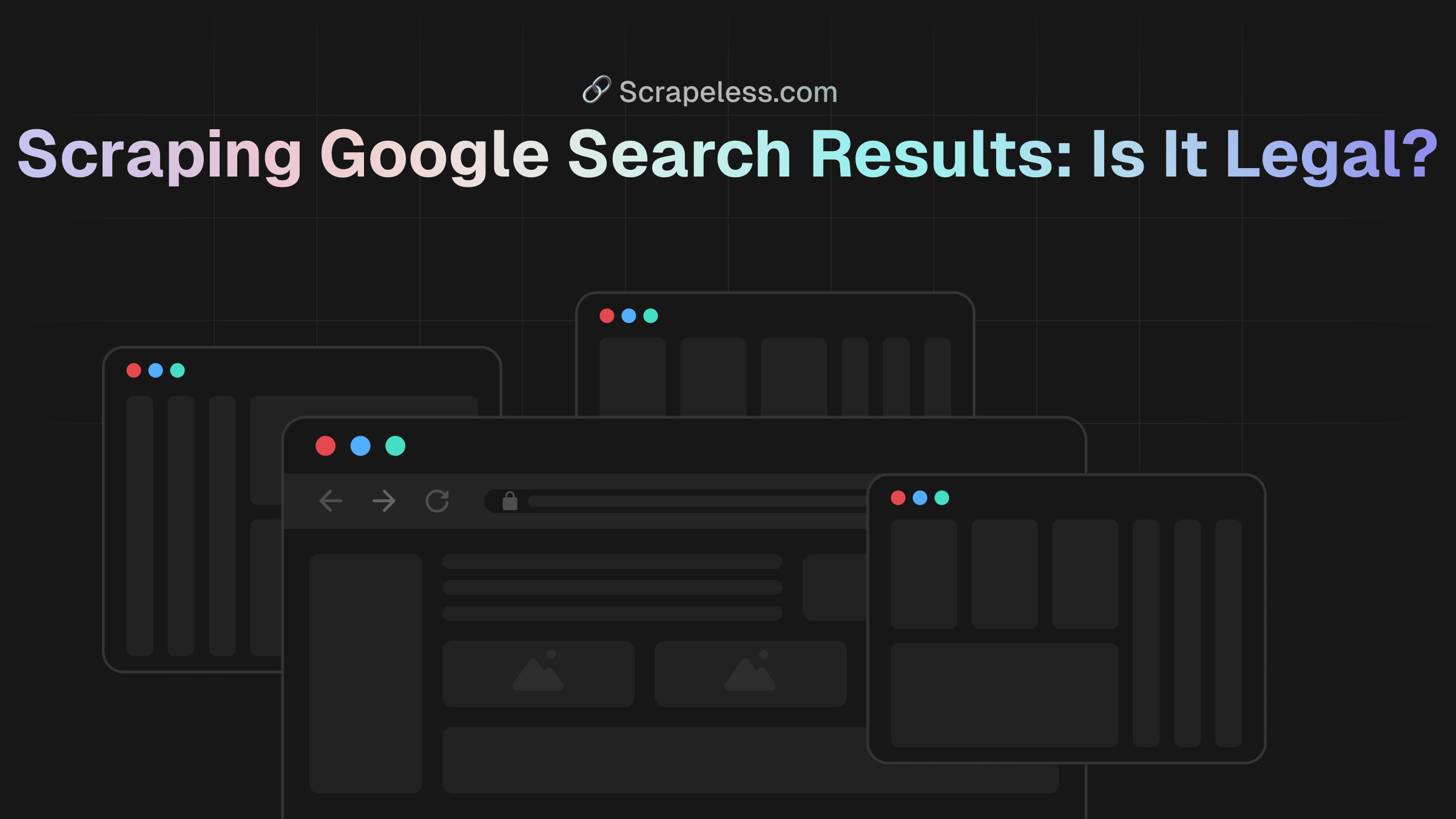Scraping Google Search Results: Is It Legal?
Advanced Data Extraction Specialist
In today's digital age, the value of data has become increasingly prominent, and web scraping has become a vital skill for developers who want to collect valuable data. Google Search is one of the important sources of information on the Internet. Its search results page contains a huge amount of information.
Developers often have the need to scrape Google search results. They hope to gain market insights and track industry trends through this data to make smarter decisions. However, the legal issues behind this operation are quite complicated. Next, let's take a deep look at all aspects of scraping Google search results.
Why scrape Google search results pages?
In the digital field, the growing demand for data, insights, and automation has prompted individuals and organizations to start scraping Google search results pages (SERPs) for the following main reasons:
-
Market research: Companies scrape search results to track their online performance and evaluate competitors. They collect data on keyword rankings, search volume, and trends to optimize their search engine optimization (SEO) strategies to stay ahead of industry competition.
-
Content creation: Content creators and marketers use scraping search results to explore fresh creative inspiration. This helps them identify hot topics, common questions, and user search intent, and then create more relevant and attractive content.
-
Competitor analysis: In a highly competitive business environment, it is crucial to keep an eye on competitors. Crawl search results allow companies to track competitors' search rankings, advertising strategies, and content performance, so as to adjust their own business strategies in a timely manner.
-
Keyword research: Effective keyword research is the foundation of SEO and content marketing. By crawling search results, it is possible to identify long-tail keywords, evaluate the difficulty of keyword optimization, and gain insight into user search behavior.
-
Advertising campaign optimization: Advertisers use search result crawling technology to optimize pay-per-click (PPC) advertising campaigns. They collect data such as ad location, click-through rate, and ad copy to optimize advertising budgets and maximize return on investment.
-
Local SEO: Local businesses improve local SEO by crawling search results. They can track local rankings, analyze customer reviews, and collect competitor data to improve their own online visibility in the local market.
Is it legal to crawl Google data using web crawling technology?
In practice, the legal status of web scraping varies by jurisdiction and purpose. Scraping may be legal in certain circumstances, such as for personal use or with explicit permission from the website owner. For example, scraping a public website for academic research purposes may be permitted if it does not harm the normal operation of the website and does not violate privacy laws.
However, if the scraping is done with malicious intent, it may trigger legal consequences:
-
Unfair competition: using scraped data to gain an unfair advantage in market competition.
-
Fraudulent behavior: using scraped data to commit fraud and other illegal activities.
-
Intellectual property infringement: using scraped data without authorization and infringing on the intellectual property rights of others.
In 2019, LinkedIn sued hiQ Labs for scraping its data, and the court ultimately ruled in favor of LinkedIn. This case once again highlights the importance of respecting the website's terms of use.
How to scrape search results from Google Search?
Nowadays, there are many ways to scrape Google search results pages. The most common method is to use a computer program, that is, to use an application programming interface (API). There are many different APIs available on the market. Let's take a look at one of the popular tools - Deep SerpApi.
Deep SerpAPI provides a cost-effective solution to help developers quickly obtain Google search results page (SERP) data. Its pricing plan is very competitive, with prices as low as $0.1 per 1,000 queries, applicable to more than 20 search results scenarios of Google.
Advantages of Deep SerpAPI
- Lowest price: Deep SerpAPI is priced as low as $0.1/k. It is the lowest price on the market.
- Easy to use: No need to write complex code, just get data through API calls.
- Real-time: Each request can instantly return the latest search results to ensure the timeliness of the data.
- Global support: Through global IP addresses and browser clusters, ensure that search results are consistent with the experience of real users.
- Rich data types: Supports more than 20 search types, such as Google Search, Google Maps, Google Shopping, etc.
- High success rate: Provides up to 99.995% service availability (SLA).
How to use Deep SerpApi to crawl Google search results data
1. Sign Up and Access the API Key
- After signing up for free on Scrapeless, you can get 20,000 free search queries.
- Navigate to API Key Management. Then click Create to generate a unique API key. Once created, just click on AP to copy it.
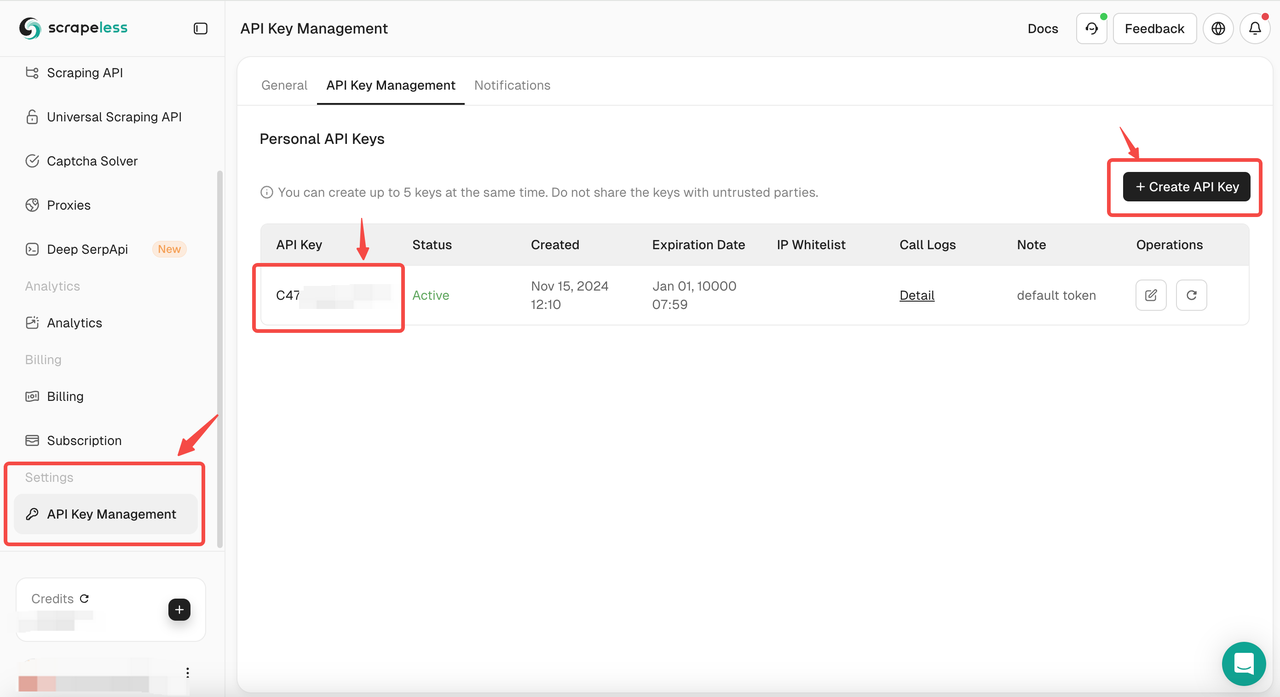
2. Access the Deep SerpApi Playground
- Then navigate to the "Deep SerpApi" section.
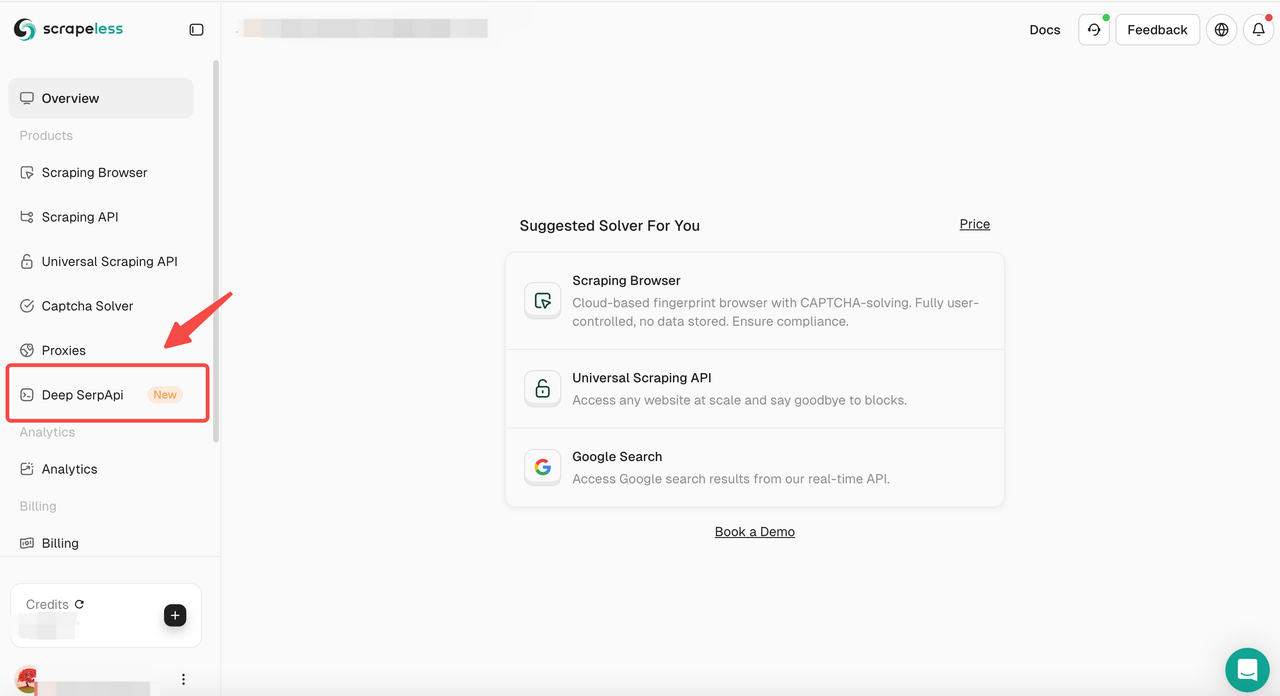
3. Set search parameters
- In the Playground, enter your search keyword, such as "Top news headlines".
- Set other parameters, such as country, language, etc.
You can also click to view the official API documentation of Scrapeless to learn about the parameters of Google Hotels.
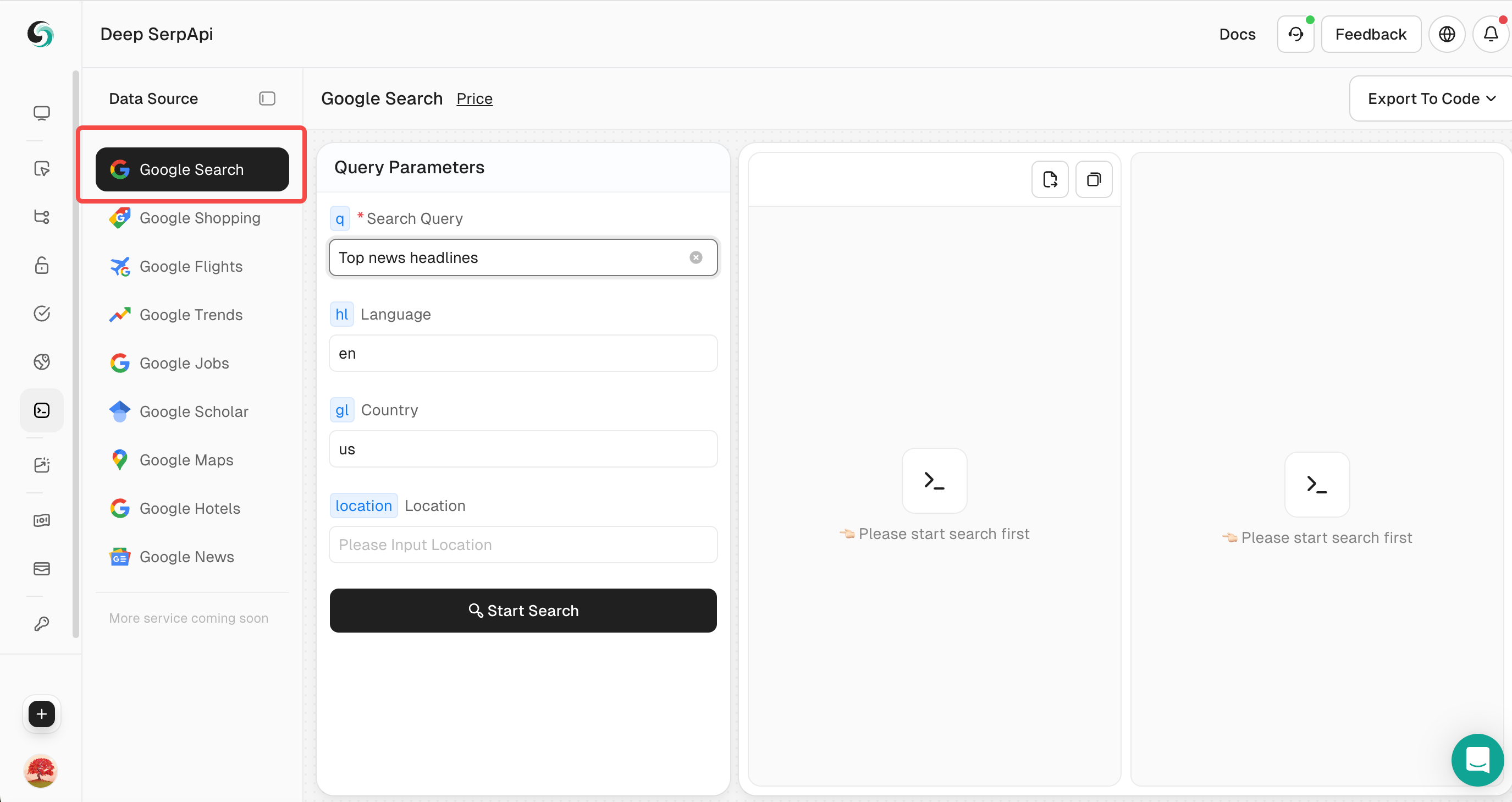
4. Perform a search
- Click the "Start Search" button, and the Playground will send a request to the Deep Serp API and return structured JSON data.
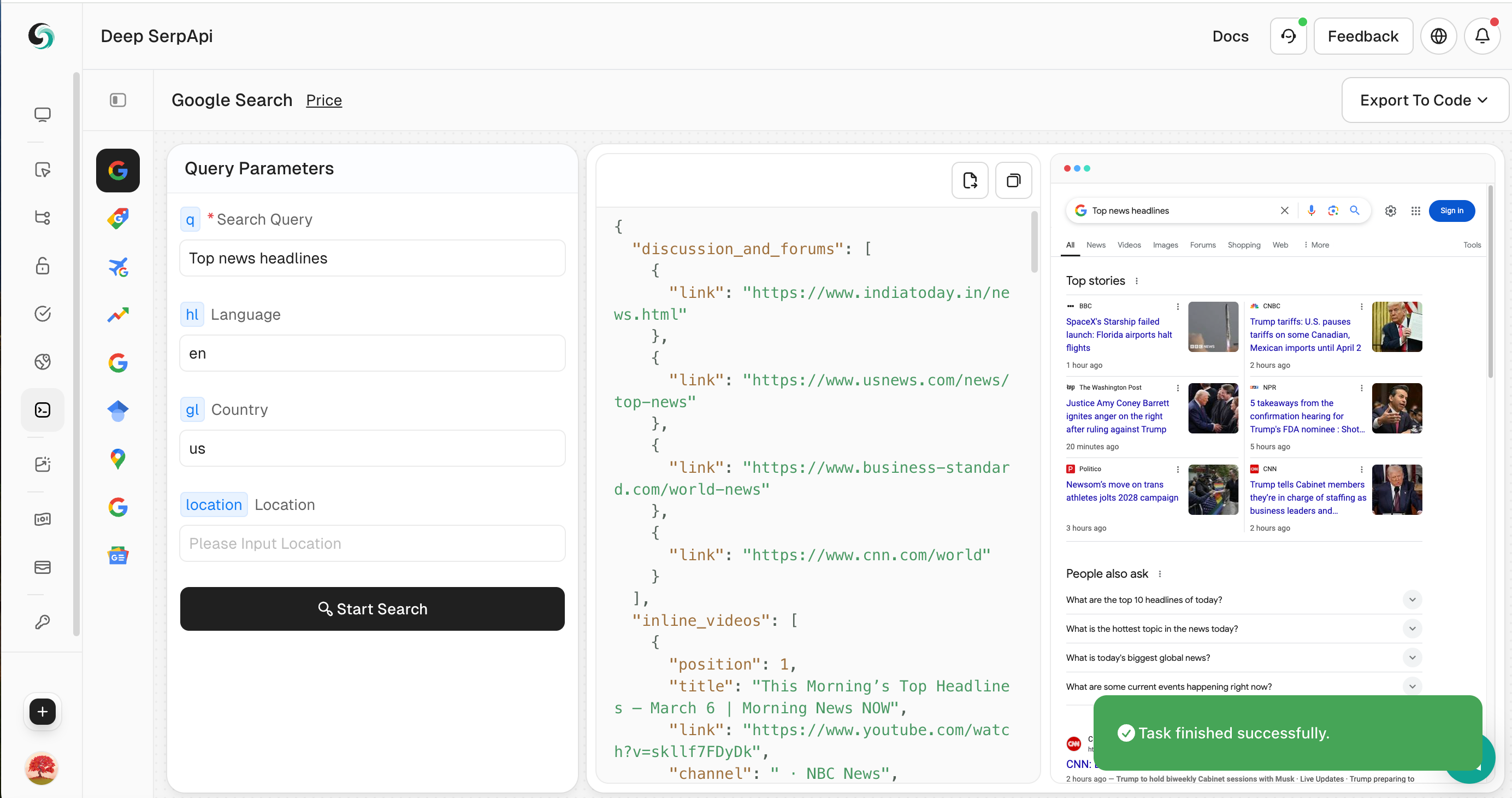
5. View and export data
- Browse the returned JSON data to view detailed information.
- If necessary, you can click "Export to Code" in the upper right corner to export the data to CSV or JSON format for further analysis.
6. Integrate into your project
- If you need to integrate the data into your application, Deep SerpAPI provides library support for multiple programming languages, including Python, JavaScript, Ruby, PHP, Java, C#, C++, Swift, Go, and Rust.
Sample code (Python)
import json
import requests
class Payload:
def __init__(self, actor, input_data):
self.actor = actor
self.input = input_data
def send_request():
host = "api.scrapeless.com"
url = f"https://{host}/api/v1/scraper/request"
token = "your_token"
headers = {
"x-api-token": token
}
input_data = {
"engine": "google_search",
"q": "coffee",
"hl": "en",
"gl": "us"
}
payload = Payload("scraper.google.search", input_data)
json_payload = json.dumps(payload.__dict__)
response = requests.post(url, headers=headers, data=json_payload)
if response.status_code != 200:
print("Error:", response.status_code, response.text)
return
print("body", response.text)
if __name__ == "__main__":
send_request()Free Developer Support Program - Deep SerpApi
Deep SerpAPI now also offers a free developer support program to help developers better integrate and use its API. Here are the details of the program:
- Integration support: Integrate Deep SerpAPI into your AI tools, applications, or projects. We already support Dify, and will soon support Langchain, Langflow, FlowiseAI, and other frameworks.
- Free support duration: After integration, developers can get 1-12 months of free developer support by sharing your results on GitHub or social media.
- Usage quota: Up to 500k usage per month, helping developers not to worry about cost issues in the early stages of the project.
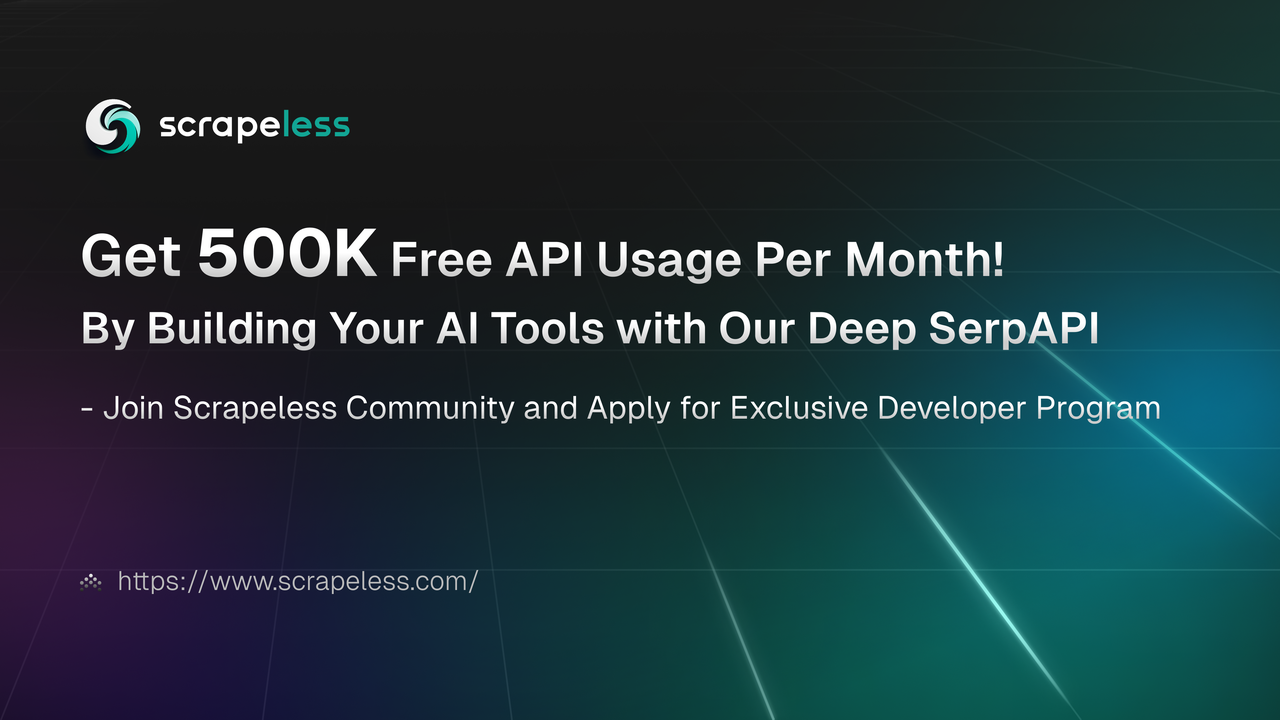
You can join Discord to contact Liam to learn about the event participation
Conclusion
The legality of scraping Google search results is a complex issue. Google’s prohibition on automated scraping is clear, but whether this behavior is legal or not depends on multiple factors, including the intent of the scraping, the region, and the content of the scraping. Therefore, it is important to be cautious when performing related operations, strictly abide by the website’s terms of use, and obtain authorization in advance when necessary.
Legal cases such as LinkedIn v. hiQ Labs remind us of the importance of following the rules. Whether it is an individual or a business that wants to collect data from Google or other websites, it is crucial to consult a professional lawyer and adopt ethical scraping methods, which is the key to avoiding legal disputes.
FAQ
1. Is it legal to scrape Google search results?
The legality of scraping Google search results is complex and depends on the intent of the scraping and the region. Be sure to follow the relevant rules and seek legal advice when necessary to avoid potential problems.
2. What tools can be used to scrape Google search results?
Scrapeless Deep SerpApi is a tool that can effectively scrape Google search results for a variety of data acquisition needs.
3. How to scrape Google search results with Python?
Deep SerpApi supports crawling Google search results page data using Python. For details, please refer to its official documentation.
If you are interested in crawling Google search results, you can go to Scrapeless official website to register for free and start your data crawling journey.
At Scrapeless, we only access publicly available data while strictly complying with applicable laws, regulations, and website privacy policies. The content in this blog is for demonstration purposes only and does not involve any illegal or infringing activities. We make no guarantees and disclaim all liability for the use of information from this blog or third-party links. Before engaging in any scraping activities, consult your legal advisor and review the target website's terms of service or obtain the necessary permissions.
